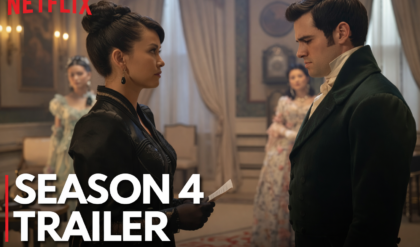Netflix’s Adolescence has stormed the streaming landscape since its March 13, 2025 premiere, amassing a jaw-dropping 66.3 million views in its first two weeks and claiming the title of the UK’s most-watched streaming debut ever with 6.45 million premiere viewers. The four-part British crime thriller, co-created by Jack Thorne and Stephen Graham, has captivated audiences with its one-shot filming technique and a gut-wrenching tale of 13-year-old Jamie Miller (Owen Cooper), a white teen accused of murdering his classmate. Boasting a 98% Rotten Tomatoes score and dominating charts in over 75 countries, the series has been hailed as a cultural lightning rod, tackling youth violence and online radicalization. But beneath its triumph lies a firestorm: netizens are raging over claims of “race-swapping” the main character, calling it “deeply evil” and “dishonest.” Here’s the full scoop on the controversy rocking this Netflix hit.
A Smash Hit Sparks a Storm
Adolescence follows Jamie, a seemingly normal boy whose arrest for stabbing Katie Leonard unravels his family—Eddie (Graham) and Manda (Christine Tremarco)—in real time. Inspired by the UK’s knife crime crisis (18,500 offenses in 2023, per the Ministry of Justice) and the “manosphere” influence of figures like Andrew Tate, it’s struck a nerve. UK Prime Minister Keir Starmer praised it as “essential viewing” on March 22, 2025, after watching with his teens, while its 42 million Week 2 views cement its global pull. Critics adore it—Variety calls it “unflinching”—and fans on X laud its raw power: “A must-watch,” one posted.
Yet, a vocal online faction has turned praise into outrage, accusing the show of rewriting reality. At the heart of their fury? The casting of white newcomer Owen Cooper as Jamie, when some claim the story draws from real-life knife crimes by non-white teens, like Hassan Sentamu’s 2023 murder of Elianne Andam or Axel Rudakubana’s 2024 Southport stabbings. “Deeply evil, dishonest,” fumed X user Hunter Ash, alleging a deliberate “race-switch” to shift focus from immigration to toxic masculinity. The backlash has snowballed, and it’s tearing the internet apart.
Race-switching a murderer in your show to change the topic from immigration to toxic masculinity is so deeply evil and dishonest I have trouble properly expressing my rage. https://t.co/ZSGV1mwQyI
— Hunter Ash (@ArtemisConsort) March 20, 2025
The Race-Swapping Accusations
The controversy erupted days after the premiere, fueled by posts on X. Irish commentator Keith Woods juxtaposed Cooper’s Jamie with Sentamu, an 18-year-old of Ugandan descent jailed for life in March 2025 for Andam’s killing, claiming Adolescence “race-swapped” a Black migrant killer into a white boy. “This is how Netflix portrays a knife murderer,” he posted, earning a “wow” from Elon Musk and millions of views. GB News presenter Patrick Christys piled on, decrying the show for “unfairly demonizing white working-class boys,” while X user @HoodedClaw1974 called it a “classic deflection” from immigrant crime.
The narrative took hold: Adolescence, netizens argue, twists real cases—Sentamu’s Croydon stabbing, Rudakubana’s Southport attack (three girls killed)—to fit a “woke” agenda, making a white teen the villain. “They brainwash us into believing white men are the problem,” one X post raged, “when it’s immigrants.” The fury’s visceral—42,000 reshares on Woods’ post alone—fueled by a belief Netflix swapped races to dodge thorny issues like immigration and push a toxic masculinity narrative instead.
Creators Fire Back
Thorne and Graham haven’t stayed silent. On The News Agents podcast on March 25, 2025, Thorne blasted the claims as “absurd,” insisting, “There is no part of this that’s based on a true story.” He argued the series isn’t tied to any single case—Sentamu’s or otherwise—but reflects a broader trend of youth violence across demographics. “It’s ridiculous to say this crime is only committed by Black boys,” he snapped, debunking the race-swap myth. Graham, speaking to Tudum, said the goal was a universal story: “We wanted a family you’d see next door—not about race, about kids today.”
Netflix echoed this, stating on March 21 via WhatsOnNetflix, “Jamie’s story isn’t based on a real person or event—it sprang from reports Graham heard of boys in knife crimes.” Production began in July 2024, predating Southport, and drew from a tapestry of incidents, not one killer’s profile. Thorne’s frustration peaked on Channel 4 News: “This is about male rage, not immigration—it’s fiction, not a documentary.”
The Facts vs. The Fury
The netizens’ case hinges on timing and optics. Sentamu, 17 at the time of Andam’s murder, stabbed the 15-year-old in broad daylight—a crime sentenced just as Adolescence aired. Rudakubana, 17 during the July 2024 Southport attack, was born in Cardiff to Rwandan parents, not a migrant as some claim, per PolitiFact. Both killers are non-white, contrasting with Jamie’s white casting, feeding the “swap” narrative. Yet, knife crime stats—17.3% of offenders aged 10-17 in 2023—cut across races, with white teens like Kyle Clifford (jailed 2024 for killing three women) also culpable.
Critics ignore this complexity. X posts fixate on Sentamu and Rudakubana, overlooking Adolescence’s broader inspiration—Graham’s reaction to multiple news stories, not one case. The show’s Andrew Tate nod and incel focus align with white radicalization too, like Elliot Rodger’s 2014 rampage. Thorne’s “no true story” line holds: Jamie’s a composite, not a copy.
The Cultural Fallout
The backlash has split the fandom. Supporters on X rally—“It’s art, not a court record,” one wrote—while detractors seethe. “Dishonest” trended on March 20, with 72,000 likes on Ash’s post. GB News’ Christys claimed it “targets white boys,” a view Darren Grimes echoed, calling it “anti-male propaganda” on his site. The noise drowned out praise from Starmer and educators pushing its classroom use, per a March 25 Guardian piece.
Thorne faced personal attacks—trolls mocked his looks—yet stood firm. “It’s sparked the right talk,” he told the BBC, eyeing policy shifts on online safety. Netflix, silent on Season 2 as of March 26, 2025, revels in the 24.3 million four-day haul, but the race row tests its “brave” halo.
A Debate That Won’t Die
Is Adolescence “deeply evil”? Netizens say yes, seeing a whitewashed lie. Creators say no, crafting a universal cry. The truth—fiction inspired by a crisis, not a case—gets lost in the shouting. Streaming now on Netflix, its four-episode run is a triumph shadowed by rage. Love it or loathe it, Adolescence has people fuming—and that’s a power all its own.





